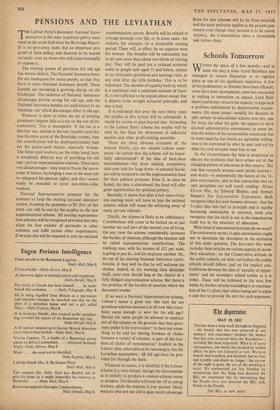Schools Tomorrow
W1THIN the space of a few months—and in none too easy a time—Lord Hailsham has managed to restore Education to its rightful place as one of the significant ministries. A few of his predecessors as Minister have been efficient; more have been incompetent; none has succeeded in making so immediate an impact. Lord Hail- sham's particular virtue is his capacity to approach a problem unblinkered by departmental require- ments. On some issues—notably his decision to split certain co-educational schools into two, one for boys, the other for girls—he appears to have allowed administrative convenience to come be- fore the wishes of the communities concerned; but in most cases he has shown an agreeable willing- ness to be convinced by what he sees, and not by what his civil servants want him to see.
In the circumstances the time is propitious to discuss the problems that have arisen out of the changing pattern of education in this country. The one that currently arouses most public interest— and wrath—is undoubtedly the future of the 11- plus examination; and in this connection two re- cent pamphlets are well worth reading : Minus Eleven Plus, by Edward Blishen, and Stewart Mason's The Leicestershire Experiment. Both recognise what has now become obvious: that the 11-plus idea was bad in principle and is rapidly becoming unworkable in practice; both also recognise that the fault is not in the examination itself but in the structure of education.
What kind of educational structure do we want? The controversy on the 11-plus examination ought not to dominate the discussion to the exclusion of this wider question. The Spectator this week includes three articles on various aspects of secon- dary education : on the Conservative attitude to the public schools; on what curriculum the public schools should follow; and on the implicit con- tradictions between the idea of 'equality of oppor- tunity' and the secondary school system as it is today. These will be followed in the next few weeks by further articles (including a re-examina- tion of the 11-plus); their object being not to argue a case but to provide the text for such argument.


































 Previous page
Previous page